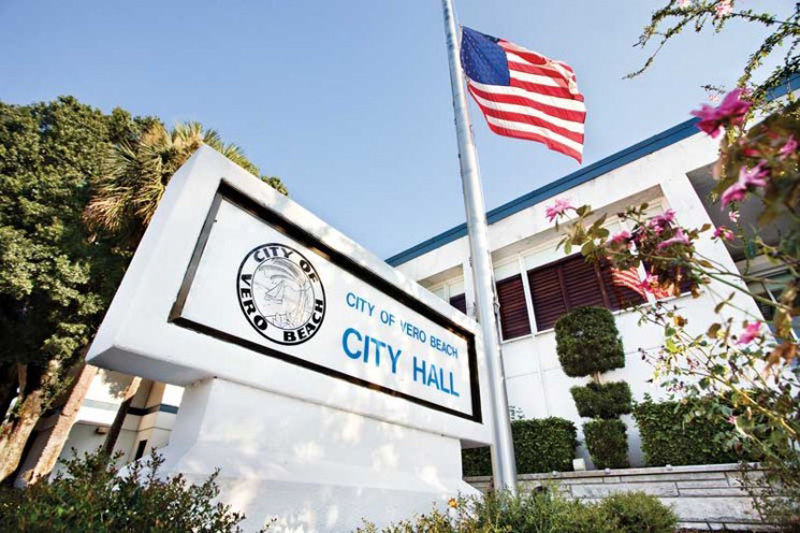VERO BEACH — After a lengthy presentation by Mayor Dick Winger, the Vero Beach City Council voted 4-1 to direct staff to begin the groundwork necessary to develop a plan to form a stormwater utility.
The stormwater utility fee that would be charged has been estimated to be $3 to $5 dollars per month for the average single-family home and would also be assessed on properties that are currently exempt from property taxes, such as churches and schools.
The money would be used to install and maintain structures that would manage excess water from rainfall and to filter out debris before it gets into canals or into the lagoon.
A PowerPoint presentation given by Winger showed in detail what he envisions for Vero’s stormwater utility.
Each property would be assigned a number of Equivalent Residential Units or ERUs on which the stormwater fee would be based. Owners of low-value properties who pay very little in ad valorem taxes now would basically pay the same stormwater fee as the owner of a million-dollar oceanfront home on the same size piece of property with an equal impermeable footprint.
Councilwoman Amelia Graves pointed out that residents could be encouraged to make eco-friendly improvements to their properties that could help reduce their stormwater fee.
Winger noted that Vero is one of the few cities of its size that does not have a stormwater utility. City Manager Jim O’Connor said he and the public works staff would look to the City of Sebastian’s stormwater utility as a model and learn what has worked and maybe what could be done differently or better.
The Indian River Neighborhood Association has pushed for Vero to move forward on the stormwater utility, with one of the group’s representatives, Deborah Ecker, speaking from the podium Tuesday night.
“I can’t tell you how important this is,” Ecker said, in regard to the health of the Indian River Lagoon. Nutrients that drain from lawns and paved surfaces are thought to be a major cause of pollution in the lagoon, along with effluent runoff from septic tanks, which can also be made worse by flooding.
“I just don’t see how you have any choice. We strongly urge you to adopt this,” Ecker said.
Winger said the city is $500,00 short per year in the funds it needs to pay for stormwater improvements. By comparison, that half-million dollars equals approximately 12.5 percent of the property taxes currently collected.
Councilwoman Pilar Turner, who consistently raised concerns that a stormwater utility is just a less transparent way to tax city residents than property taxes, opposed the action, saying, “We need to look at alternatives without creating another layer of government.”
“Let’s keep the transparency in government, if we need to raise taxes let’s put it up to the voters,” Turner said.
Winger argued that it would take Vero 19 years to have enough cash to install the infrastructure to reduce stormwater throughout the city and that is too much time to waste. With a stormwater utility, he said, that work could be completed in five or six years.
The stormwater utility would be set up as a separate enterprise fund of the city and fees would be billed to each property based upon the total area and the portion of the property that is an impermeable surface.
Satellite mapping technology would aid the staff in determining how much of each property is green space or retention pond or other permeable surface and how much is paved or impermeable.
Vice Mayor Jay Kramer, who voted in August to study how a stormwater utility might be set up and run, had initially questioned the wisdom of the stormwater utility because, like Turner, saw it as another way to levy a tax and thought that, once established, it would be a revenue stream that would continue indefinitely.
“I always ask questions. I expressed concerns,” Kramer said after the vote where he joined Winger, Councilwoman Amelia Graves and Councilman Randy Old in favor of the staff directive.
Old, during the discussion prior to the vote, expressed his support for the plan as a worthy expenditure of dollars to protect the lagoon. “I have a feeling that this is something that this is something that’s going to require funding for a long time going forward.”
Kramer said after the vote, “The issue is do you pay for stormwater improvements through general tax or pay for the improvements through a targeted fee system, i.e. should it be paid by the taxpayers or by the entities that use the system.”
About his initial skepticism, Kramer said, “The concern I had was that it was to become a separate entity. What they are talking about is a separate accounting system, no new employees.”
Winger explained that Tuesday’s vote was just an initial step, that there would be much study and, at the urging of Graves, that much public input would be sought before a final plan was implemented.

